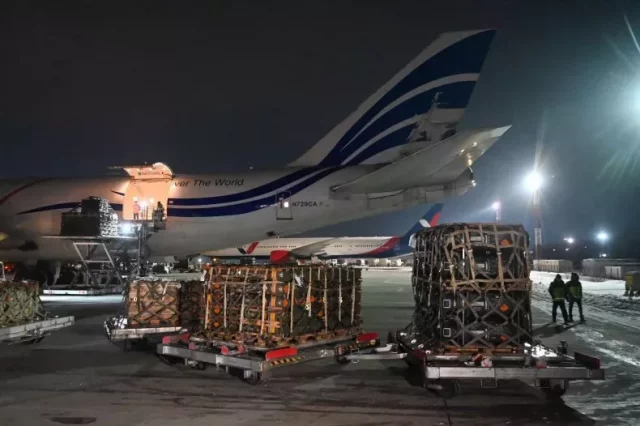
“Jaw, jaw, jaw is better than war, war, war,” intoned Winston Churchill; it rhymed when he said it. Unfortunately, the Biden administration appears to be jawing its way toward a war between Russia and Ukraine that could involve the United States. After weeks of unproductive talks between Russia and the U.S., and between Russia and NATO, the administration and its allies have chosen to ratchet up the threat.
In a meeting with Russian foreign minister Sergei Lavrov, Secretary of State Antony Blinken warned of “massive consequences” should Russia invade Ukraine. British prime minister Boris Johnson has warned that a “lightning war” in Ukraine could not be ruled out, and that such a war would be “painful, violent and bloody.” Over the weekend, the families of American embassy personnel in Kyiv were ordered to leave the country.
In that context, a Pentagon memo—parts of which appeared in the press—describing an option to send 5,000 troops to Eastern Europe with the possibility of increasing the number tenfold if the Russians invade seems like a match on kindling. It is, admittedly, the job of the Pentagon to ensure that the president—the commander in chief—has military options at his disposal for contingencies before those contingencies become dire events. And for the Biden administration, now trying to recover its mojo after a bloody Afghanistan debacle, threats have a certain appeal.
Unfortunately, it is the sort of appeal that led Emperor Franz Joseph to declare war on Serbia in 1914. The Austrian declaration forced the Russians to mobilize and triggered military commitments among Russia’s allies, including France and England. That opened the door for Kaiser Wilhelm to attack France and Belgium, really aiming to knock out Britain. The result? Failure and 40 million casualties. A whole generation of young men lost. Millions of civilians killed, many in outrageous atrocities.
The current situation is unlikely to produce a reprise of World War I. However, we don’t know what the Russian generals want or what they have told President Vladimir Putin. We do know what NATO leaders are saying, and a lot of it is nonsense. NATO is in no position to fight Russia, even with the full weight of the United States, and has no capacity to stop a number of its eastern European members from being overrun.
Furthermore, Ukraine is not a NATO member and has no claim to NATO troops. Yet NATO has pledged an intervention force for eastern Europe of approximately 30,000 soldiers. In reality that force probably consists of 5,000, the majority of whom are Americans. NATO has strong air power, but weak air and missile defenses, and a small, armored force that could not stop a forceful assault by Russia. Russia, which lives in the neighborhood, has a reinvigorated military, a strong armor force that can be rapidly deployed, excellent mobile air defenses and plenty of missiles.
The issue, in the end, is a simple one: there is no military victory to be found here, and supporting the Ukrainian militarily is likely to prove fatal to both Ukraine and to Europe.
Negotiation is the best path forward. The Ukrainians have ducked their responsibility under the Minsk II Treaty to negotiate with Russia under the auspices of the Organization for Security and Cooperation in Europe and are pushing NATO toward an unwinnable war. Washington and its allies should be facilitating negotiations under the treaty and making it clear to Kyiv that without that step, Ukraine will get no help from the U.S. or from NATO.
This is not the message coming from the West, and the prevailing view in Washington is that we can deter Russia by making bigger and bigger threats.
A more workable approach, along with pushing Ukrainian president Volodymir Zelensky to the table, would be to put in place a negotiator who is respected by all sides. Today, Europe’s leaders are, generally speaking, weak; Washington is worse. Perhaps the only person with the stature and gravitas and understanding of both sides who can come to the rescue is former German prime minister Angela Merkel.
Dependent on Moscow for energy and trade, Germany is deeply disinclined toward war with Russia. Merkel will likely be considered by Putin the least of the Western evils. Merkel is also a strong proponent of Atlantic alliance interests and unlikely to wrangle the West into a losing posture. And there is the added benefit of having Washington take a back seat in a conversation that is European—not NATO.
Time is short. Drafting Ms. Merkel to lead the negotiation ought to be all-around acceptable and could lead to a miracle on the Dnieper.

